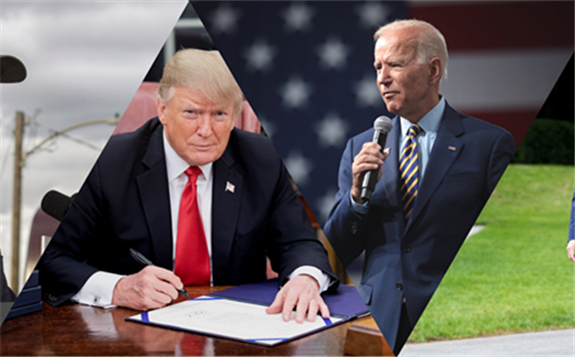The upcoming US presidential election will greatly influence the energy policies of the world’s second-most polluting country. The current leadership has spent years encouraging climate change denial while aiming to preserve current energy generation methods.
 Trump’s energy policy has focused on US oil and gas, while Biden would move toward clean energy. Credit: Matt A.J./Tia Dufour/Gage Skidmore/White House.
Trump’s energy policy has focused on US oil and gas, while Biden would move toward clean energy. Credit: Matt A.J./Tia Dufour/Gage Skidmore/White House.
Alternatively, the president’s challenger would spend billions on energy transition, aiming to develop new technologies and decarbonise the power industry. We take a look at how these potential futures would affect the energy industry, in the US and around the world.
What Trump’s second term would mean for energy policy
Donald Trump has repeatedly stated his disbelief in the facts of man-made climate change. Within weeks of his election, US government websites were purged of mentions of climate science.
Instead, Trump has claimed his energy policy focuses on maintaining jobs in existing power industries. As part of this, he has removed regulations around fossil fuel licensing and lifted environmental protections that prevented fossil energy projects. In turn, this has opened up large areas in Alaska to oil exploration and allowed Trump to push pipeline projects forward.
While the President has supported renewable power on paper, his refrain of ‘US energy dominance’ has focused on oil and gas production. Trump’s campaign for re-election has largely ignored energy policy, with Tim Mullaney of CNBC writing “Looking for policy differences between Donald Trump and his Democratic challenger Joe Biden? Biden has a climate plan – a big one. Trump simply doesn’t.” Trump’s website lists his previous energy and environment activities, promising more of what he has already done.
In 2019, approximately one-third of US power came from oil, according to the Energy Information Administration. Another third came from natural gas, 11% from coal, and 8% from nuclear. The remaining 11% of power came from renewables. This would need to increase to meet the commitments of the Paris Agreement on Climate Change.
As a result, Trump started the process of removing the US from the Paris Agreement, calling it ‘unfair’. After the withdrawal becomes effective in November, the US will be the only country to withdraw from the agreement.
Biden promises new agency to decrease price of hydrogen and energy storage
On the other hand, Democratic candidate Joe Biden has pledged to return to the agreement as soon as possible if he wins the presidency.
His campaign has said he will, in his first year, legislate decarbonisation targets for 2025. This legislation would also make ‘historic’ investment in clean energy “incentivise the rapid deployment of energy innovations”.
Practically, Biden’s party has said this would mean 500 million solar panels, eight million solar roofs and community solar energy systems, and 60,000 wind turbines installed within five years.
This forms part of a ten-year, $1.7tn plan aiming to create $5tn of wealth in the energy industry. This would also increase electric vehicle ownership, but Biden has not set a specific target for this.
Separately, Biden has pledged to establish an Advanced Research Projects Agency for Climate, to develop energy technologies. However, think-tanks have criticised this plan for reportedly duplicating the work of other agencies.
These would include large-scale energy storage at one-tenth of the cost of lithium-ion batteries, as well as small modular nuclear reactors costing half that of current reactors.
Additionally, the agency would develop technology to produce green hydrogen at the same cost as hydrogen from shale gas. It would develop carbon capture, utilisation and storage technology, looking at CO₂ storage within soil and depleted oilfields.
Bringing US energy policy into world affairs
Members of the Democratic party have often supported a Green New Deal. This plan would aim to scale up the renewable energy transition, using proceeds to eliminate poverty. Biden’s website says he believes “the Green New Deal is a crucial framework for meeting the climate challenges we face.”
During the first televised debate of the US election, Biden caused confusion by saying he did not support a Green New Deal. This claim directly opposed what his campaign said before and after the debate.
Ultimately this would contribute to Biden’s ambition of eradicating carbon pollution from the power sector by 2035. Beyond that, Biden would aim to achieve net-zero emissions by 2050.
The US is the second-largest producer of pollution of any country, behind only China. Recently China announced its ambition to reach net-zero emissions by 2060. Commentators have said this is “likely just narrative”, as its internal activity remains obscured.
Biden has also promised to “integrate climate change into our foreign policy” and use US influence abroad to “stop countries from cheating”.
This article is reproduced at www.power-technology.com